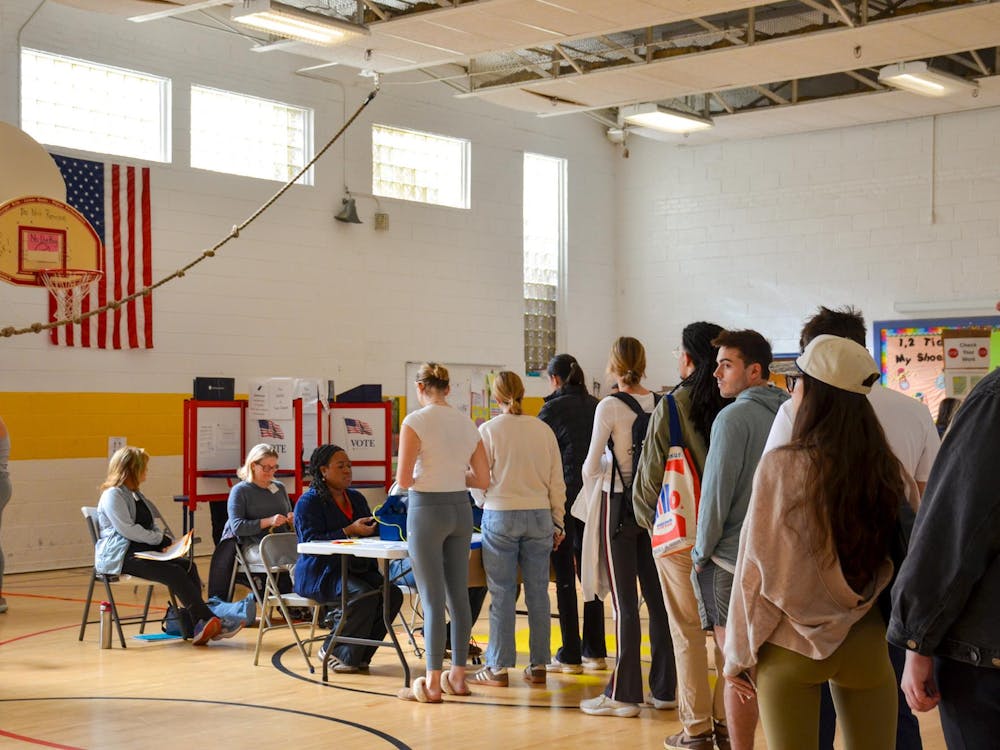Main Street echoed yesterday with cries of "Hey hey, ho ho, poverty wages have got to go!" as students and Charlottesville residents marched to demand that the Courtyard Marriott Hotel at 1201 Main Street pay its employees what activists call a "living wage."
The Labor Day demonstration was part of an almost two-year campaign by the local chapter of a statewide group called the Virginia Organizing Project to convince owners of the Marriott to pay its employees $8.65 an hour. The Marriott employs many workers, such as housekeepers, at wages below that level, organizers said.
The federal government considers a wage of $8.65 necessary to support a family of four at the poverty line, said Andrew Holden, a VOP member who said he has struggled with medical bills while making less than $8 an hour at other jobs.
Protestors have picketed in front of the hotel every Friday for 95 weeks.
Yesterday upward of 100 marchers, including a few University students, made their way from the Jefferson School on Fourth Street to the Marriott and back. Demonstrators chanted and held signs saying "Living Wage Now," and passing motorists honked to show solidarity.
Folk singer John McCutcheon performed a song in front of the Marriott, and Democratic congressional candidate Meredith Richards spoke briefly to demonstrators before the march began.
Charlottesville workers "are the people we live with," said fourth-year College student Katy Bauer, who participated in the march. "I think it's our duty as University students to be out here."
Lamar Glover, a fourth-year College student who is interning with the VOP, delivered a speech to the gathered demonstrators.
"It should not be anyone's destiny to work 40 hours a week and not be able to feed their family and pay their medical bills," Glover said.
Local cost-of-living estimates are consistent with the designation of $8.65 an hour as the "living wage" level, Holden said.
Sixty percent of workers in America, and about the same percentage of Charlottesville workers, make below $8.65 an hour, he added.
Charlottesville resident and march participant Monica Bryant said she has relatives making less than a living wage.
"I think people cannot make it on $6 an hour," Bryant said.
Sally Bastion, a schoolteacher in Louisa who participated in the march, said many of her students have parents making less than $8 an hour.
"If people made more money, they could spend more time with their kids," Bastion said.
The VOP has led several successful campaigns in recent years to secure guarantees of $8 an hour for county and city workers, contracted city workers and all employees who work directly for the University, Glover said.
One good reason for targeting the Marriott is that, like the University, it is a large employer, and thus sets standards for the business community, he said.
Marriott officials so far have beenunwilling to meet with VOP activists, said Nicholas Graber-Grace, a fourth-year College student who has helped in the Marriott campaign.
Marriott officials could not be reached for comment.
The VOP is currently involved in efforts to persuade the University to require all companies with which it contracts to pay their workers a living wage. The University decided to pay all its direct employees $8 an hour in 2000.
Students and local residents held a protest in April on the steps of the Rotunda to demand a living wage for contracted University workers.
Students participating in yesterday's march linked the two campaigns.
"I'm a student at the University and I think everyone deserves to be paid a living wage," said fourth-year College student Mary-Elizabeth Bruce.
Bruce has been active in the campaign to bring a living wage to contracted University workers.
Retired University History prof. Paul Gaston, a self-described civil-rights activist in the 1960s who participated in yesterday's march, said the living wage issue is a civil rights issue. He called for the University to stop housing guests at hotels that don't pay a living wage -- which would currently mean all hotels operating in Charlottesville -- just as it stopped holding University events in segregated establishments in the 1960s.
"The University, and I speak mainly of my good friend [University President] John Casteen and my good friend Leonard Sandridge [executive vice-president and chief operating officer], will not put a living wage at the top of their priorities," Gaston said.
Casteen has said in the past it may be legally problematic for the University to require a living wage for its contracted employees.






